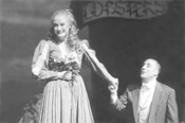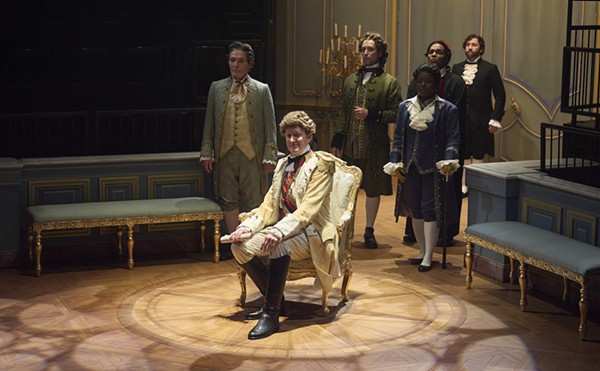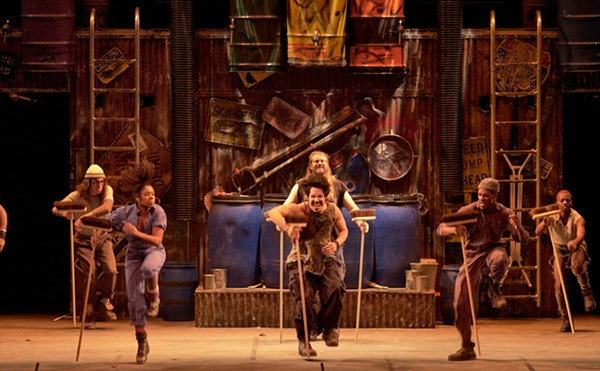Ohio Light Opera's mandate is to preserve and protect the sentimental and teary joys of operetta, a form of blissful escape that blends storybook romance and effusive music and is as alien to most modern audiences as Egyptian hieroglyphics.
Wooster has made a savvy choice with Carousel. In this pioneer work, Oscar Hammerstein II continued the evolution he started in Show Boat, blending operetta's lyricism with darker psychological conflicts. Carousel is based on Ferenc Molnar's 1909 play Liliom. This tough-minded fantasy tells the story of a Budapest sideshow barker, his troubled marriage, and subsequent trial in heaven, resulting in a chance to redeem himself on earth. It has been reset in a folksy 19th-century New England, where people break into sea chanteys, warble odes to June at the drop of a picnic basket, and at the first sign of trouble, intone inspiring psalms ("When you walk through a storm, hold your chin up high . . ."). The show became the template for musical theater in the second half of the 20th century, blending operatic musical intensity and musical comedy vitality.
In the last few years, it has been fashionable to water down Carousel's 1940s whipped-cream vocalism and gingerbread trimmings. In a hugely successful recent Broadway/London revival, the director emphasized the fatalistic destructiveness implicit in the script, turning the hero and heroine into alienated, seething rebels. The show was propelled into the realm of social protest musicals.
Fortunately, the Ohio Light Opera has pledged its troth to the past and once again wears its romantic heart on its sleeve. Set designer Richard Traubner evokes a wholesome Winslow Homer New England, made even more authentic by meticulous costumes. Choreographer Carol Hageman creates a graceful approximation of Agnes DeMille's legendary original dances. With Steven Byess's lush conducting and the bracing vocalism of every part of the score, the evening becomes the equivalent of stereophonic sound and road-show grandeur.
Director Sarah McGraw excels in verisimilitude. She knows how to build suspense, milk pathos, and most important, make scenes glow with palpable romantic tension. Only the overextended prologue lacks the electricity to complement the ravishing "Carousel Waltz" that accompanies it.
Carousel has never been a star vehicle; it's a true ensemble musical. The cast members, from romantic leads to second sailor to the right, are so inspiring and fetching that we can imagine that Rodgers and Hammerstein themselves handpicked them to head up the first road company.
Encountering Wooster's dynamic Carousel is like unexpectedly rediscovering your aged grandparents in their first flush of youth, beauty, and exuberance.
Bay Village's Huntington Playhouse, a converted barn where past generations of randy farm boys rolled in the hay, now is home to 22 part-time thespians who, in the farcical tradition, race through American theater's most indestructible comedy, The Man Who Came to Dinner. They do this with the heavy-handed enthusiasm of contestants in a Kiwanis sack race.
Back in the '30s, Alexander Woollcott, who was king of the radio and lecture circuit, browbeat renowned playwrights George S. Kaufman and Moss Hart into fashioning him a stage vehicle. They came up with the tale of a famous lecturer, one Sheridan Whiteside, who is invited to dinner in a small Ohio town by a conventional, provincial couple. He slips on the ice on their front steps, fractures his hip, and subsequently is trapped like a panther in a cage of small-town rubes. Despotically, he takes over the house from his unwitting hosts and turns it into an asylum for his eccentric friends (including fictionalized portraits of Harpo Marx, Noël Coward, and Gertrude Lawrence). Although the specific period references have dated, the play is kept fresh by capturing the exultation of belonging to a fraternity of the glamorous and famous, blithely trodding over commonplace folk.
When it opened in 1939, Brooks Atkinson of The New York Times proclaimed it "the funniest comedy of the season." In its 62 years, it has thrived wherever there is a curtain and English-speaking actors, from high school to army base.
Huntington has pulled off the year's most enjoyable gimmick by having the curmudgeonly radio commentator/critic Whiteside acted by the equally curmudgeonly newspaper columnist/TV commentator Dick Feagler. This doyen of Cleveland nostalgia may not be ready to turn in his typewriter for doublets and tights, but he certainly is able to approximate with aplomb the snapping-turtle persona of Whiteside. In the best of all possible worlds, his director, Tom Meyrose, would have persuaded Feagler to sound a tad less like an F.D.R. impersonator and not deliver each quip with the same exclamation point. Yet this is a case of fiendishly perfect casting. Feagler's petulant disdain carries the evening and elevates an amiable, willing cast halfway to a comedy Valhalla.












